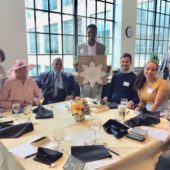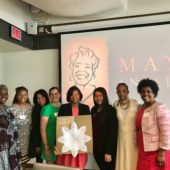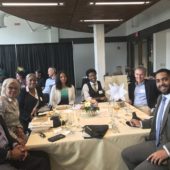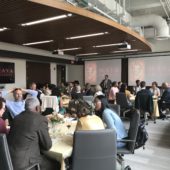Legacy I Winston-Salem, NC




A group of Undergraduate Students, Faculty, and Staff gathered over lunch on Sunday, April 7, 2019, to discuss what “Legacy” means to them. This event was in coordination with the Dr. Maya Angelou Garden Party that celebrated her 91st birthday with food trucks, poetry readings, music, lawn games, and more.
Overview and highlights of our Call to Conversation:
Table 1:
We began our conversation by sharing prominent examples of the legacies left by influential people around us. From these revelations, we recognized that our predecessors positively influence the way we act today from leading by example.
A few specific points include:
- We are encouraged to acknowledge and respect others through the inclusive actions of our predecessors
- It is better to give, rather than to receive
- What legacy do we want to leave?
Table 2:
- “People will forget what you said, people will forget what you did, but people will never forget how you made them feel” — keep showing up and being kind
- Legacy is inherited through our families and cultures, and passed on to our children
- Continuing the legacy by teaching and encouraging those who come after you
- Without history, we cannot move forward
- Importance of culture and heritage experienced through narratives and storytelling
- Legacy comes with time and effort — be patient, learn that you are enough
- Legacy evolves and changes, and you can have more than one legacy
Table 3:
- Our lively conversation at Wake Downtown touched on and included all aspects of each of our collective experiences, including personal stories of Dr. Maya Angelou, the impact of role models and influential people in our lives, and the enduring legacies of everything from individuals to broader historical periods. Our lunch together was truly a great way to celebrate the life and legacy of Dr. Maya Angelou.
- The story of Dr. Angelou’s Thanksgiving speech about inclusivity, kindness, respect and having compassion towards others.
- We discussed how a legacy will always outlive the individual, and how a legacy is constantly evolving with every new generation.
- We also talked about the collective legacy of a people, and how entire cultures deal with the legacies of their past and must explain them to both outsiders and the next generation
- Another story from Dr. Angelou was when she was asked at a weekend barbecue, “What is the hardest thing you’ve ever done?” To which she immediately responded, “See Jesus in those I dislike.”
Table 4:
- Over the course of our conversation, we explored what legacy means, and exactly how Dr. Angelou represented legacy for each one of us. We discussed personal memories of times in her presence and the importance of recognizing one’s worth—a concept Dr. Angelou sought to spread with each one of her interactions.
- The importance of family was highlighted multiple times along with the fact that family is anyone we choose for it to be—anyone we welcome into out homes and our hearts.
- Respect was another concept which appeared consistently. Respect for others, respect for one’s self, and respect for future generations—a respect which we, over the course of our conversation, came to realize should bolster all of our actions as we work towards leaving legacies of our own.
- Another highlight of our conversation was found in the impact of a single interaction, and how a mere conversation with another human being can impact who we are for years to come. I really want to highlight this theme as it seems incredibly timely in the wake of our conversation. We gathered to discuss what legacy means and proceeded to share pieces of ourselves with each other, thus spreading our own legacy. We then moved out of the space created by our Call to Conversation and back into the world where we continued to spread the thoughts and ideas about how we can better ourselves and our communities—our families. Ultimately, this call to conversation provided us with an opportunity for reflection on what we’ve received from others like Dr. Angelou and what we have, and intend, to give to others.
